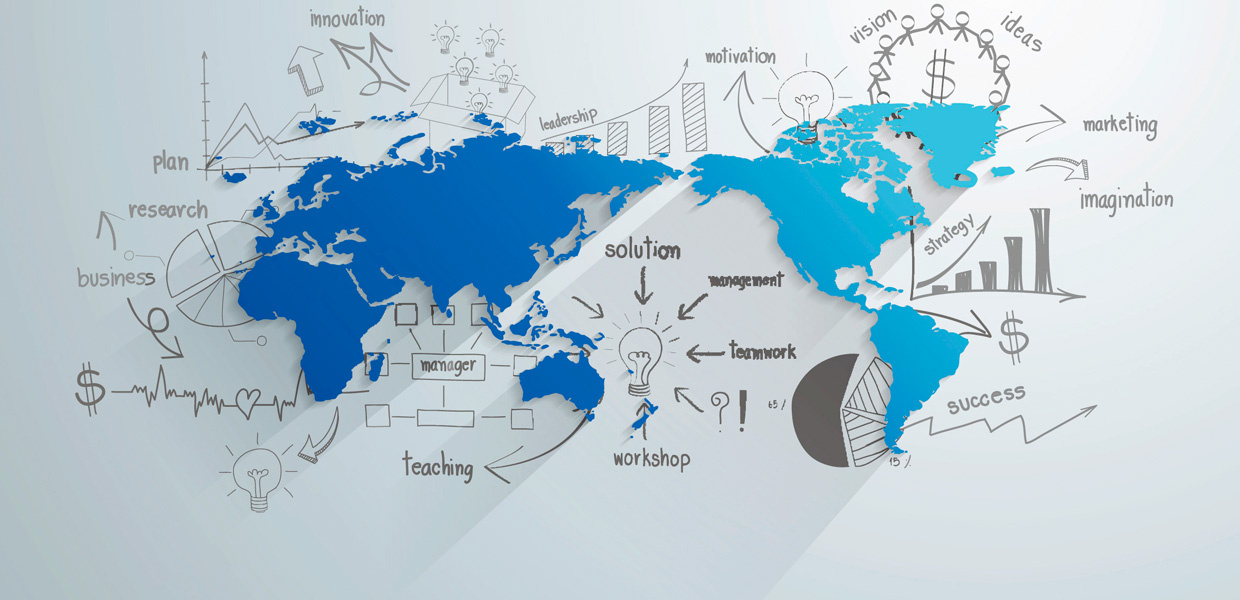In the Globalization Report, the degree of global interconnectedness is calculated using an index which is closely aligned with the KOF Index of Globalization created by the Swiss Federal Institute of Technology (ETH) in Zurich. Between 1990 and 2007 the average index value of the 42 countries increased considerably, rising from 46.4 points to 65.1 points. It declined in the following years, though, and has been stagnating since 2011. In 2014, the index value was 62.6 points on average. This means the annual welfare gains caused by globalization have also been shrinking. Whereas real gross domestic product (GDP) grew on average by roughly 610 euros per capita and year between 1990 and 2011 – the observa-tion period of the previous study – due to the effects of increasing globalization, in the extended period (1990-2014) this figure was only around 580 euros per capita. Nevertheless, the overall balance is positive. During the period under review, the GDP of all 42 countries investigated increased by almost 970 billion euros per year on average, due to increasing globalization. This roughly equates to the economic output of a medium-sized economy like Spain or South Korea. "Protectionism is not a convincing answer to the financial crisis. We need new impetus for growth and global interconnectedness in order to ensure welfare gains for industrialized, emerging and developing countries alike," said Aart De Geus, Chairman and CEO of the Bertelsmann Stiftung, commenting on the findings.
Japan benefits the most from increasing globalization
Compared to other countries, wealthy industrialized nations have tended to benefit the most from globalization. In Japan, the country with the highest income gains brought about by globalization, the GDP per inhabitant resulting from increasing globalization grew on average by 1,470 euros per year. The authors believe that the main reasons behind this development are the increase in Japanese foreign direct investment and the rise in foreign trade in the services sector. This led to Japan being one of the seven countries that have been able to increase their level of globalization since 2007.
Germany among the winners of globalization
The international crises of recent years have also left their mark on export nation Germany. Since as early as 2003, Germany's level of globalization has been declining. It decreased from 73 points in 2003 to 65.7 points in 2014. Nevertheless, Germany is among the ten countries that benefit the most from globalization. Every year between 1990 and 2014 GDP increased on average by 1,130 euros per capita as a result of increasing globalization.
Similarly high increases to those shown by Japan and Germany were achieved by Switzerland (1,360 euros), Finland (1,340 euros), Denmark (1,210 euros) and Ireland (1,130 euros). "The findings of the study show that globalization does not need to degenerate into a race for the cheapest jobs. The winners of globalization should therefore set a good example in order to promote the further integration of national economies," said Aart De Geus.
Emerging countries bring up the rear
The lowest gains brought about by globalization were to be found in the so-called BRIC countries. In terms of GDP, Brazil, Russia, China and worst-performer India did benefit from globalization as a whole, but to a much lesser extent than the industrialized nations did. Their average GDP increases ranged from 120 euros per capita and year (Brazil) to 20 euros per capita and year (India). According to the director of the study, Thieß Petersen, the poor performance of emerging nations is partly due to existing trade restrictions, but partly also to macro-economic conditions. "The lower the initial level of GDP is, the lower the absolute increases are, too. In addition it is also the case that the later the onset of globalization occurs in a country, the shorter the period of time is in which to achieve possible globalization gains", said Petersen.
Bertelsmann Stiftung experts call for new growth impetus
In order to revitalize stagnating globalization, the experts at the Bertelsmann Stiftung believe it is necessary to improve the integration of emerging and developing countries into the global economy. It is precisely these countries that still have great globalization potential and could therefore generate correspondingly high globalization-related growth effects. To achieve this, it is important that industrialized nations open up their markets to products from less developed countries, reduce their subsidies for agricultural products and provide financing opportunities. This would allow emerging countries to finance the necessary infra-structure, educational measures and production facilities.
Additional information
Within the scope of the Globalization Report, increases in globalization are measured using the so-called "Globalization Index", which is closely aligned with the KOF Index of Globalization created by the Swiss Federal Institute of Technology (ETH) in Zurich. In addition to indicators on economic globalization, this also includes aspects of social globalization (tourism, migration) and political globalization (institutionalized interconnectedness, foreign relations, etc.). The index used in the Globalization Report adopts the KOF Index of Globalization's sub-indexes for social and political aspects of globalization, but gives them less weight. The economy sub-index takes into account transaction volumes such as trade or investment on the one hand, and transaction limits such as duties, taxes or capital controls on the other. The data enables a globalization index to be drawn up for every country and every year, with scores between 0 and 100. The higher the number of points on the index, the more interconnected that country is with others in the world. In the "Globalization Report 2014", we examined to what extent 42 industrialized and emerging countries benefited from increasing globalization between 1990 and 2011. In the "Globalization Report 2016", we extend the period under review to cover 1990 to 2014. In the first report, an increase of one point on the globalization index led to an increase of 0.35 percentage points in the growth rate for real GDP per inhabitant. Now the corresponding GDP growth is 0.31 percentage points.
